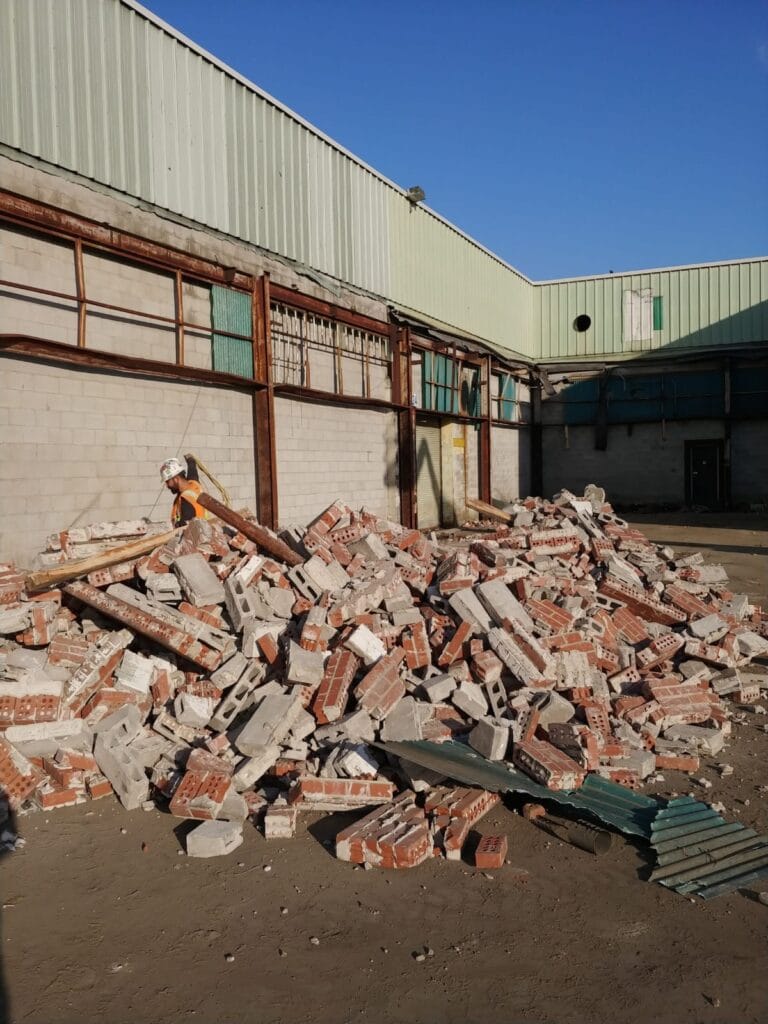If you’re planning an industrial demolition project in Toronto, managing waste disposal and recycling doesn’t have to be a headache. With the right approach, you can easily meet Toronto’s strict environmental regulations, avoid costly fines, and reduce your project’s carbon footprint. In fact, proper waste management can actually save you money while ensuring a smooth and efficient demolition process.
The key to success is understanding how to effectively separate, recycle, and dispose of materials in line with local regulations. Whether it’s handling hazardous materials, ensuring the safe disposal of concrete, or minimizing waste, we’ve got the solutions that will keep your project on track and compliant.
Table of Contents
ToggleHere’s how you can effectively manage waste and recycling during your industrial demolition project in Toronto:
1. Conduct a Pre-Demolition Waste Assessment
Before beginning the demolition process, it’s crucial to conduct a waste assessment. This will allow you to identify which materials can be recycled, reused, or safely disposed of. A pre-demolition assessment is an essential step in planning your waste disposal strategy.
How to Implement a Pre-Demolition Waste Assessment:
- Identify recyclable materials: Concrete, metals, and wood can often be reused or recycled, reducing your project’s environmental impact.
- Assess hazardous materials: Check for asbestos, lead, or chemicals that need specialized handling.
- Plan waste removal logistics: This will help you avoid delays during the demolition phase by ensuring that proper disposal facilities are arranged.
By conducting this initial assessment, you ensure that no materials are overlooked and that your waste disposal process is as efficient as possible.
2. Separate Recyclable Materials on Site
One of the most effective ways to reduce waste during demolition is by separating recyclable materials on-site. Sorting materials as you work helps streamline the recycling process and ensures that everything is disposed of in compliance with Toronto’s regulations.
Key Materials to Separate:
Metals (Steel, Aluminum, Copper):
Metals are valuable and highly recyclable. They should be sorted separately from other waste materials.
Wood:
Wood from beams and other structural elements can often be reused or converted into mulch.
Concrete and Masonry:
Concrete should be separated and crushed into smaller pieces for use as aggregate in new construction projects.
Proper separation of materials also reduces the need for disposal containers and can lower your overall waste removal costs.
3. Work with a Professional Demolition Company Specializing in Waste Management
Handling waste disposal and recycling in industrial demolition projects can be complex, which is why working with a specialized demolition company is a smart choice. A company with experience in managing waste in Toronto’s urban environment will help ensure everything runs smoothly and in compliance with all relevant regulations.
Why Partnering with TheFixitGuys is the Right Choice:
At TheFixitGuys, we specialize in industrial demolition services and take care of the entire waste disposal and recycling process. From separating materials on-site to ensuring proper recycling practices, we manage it all so you can focus on other aspects of your project.
4. Recycle Concrete and Masonry Materials
Concrete is one of the largest contributors to landfill waste in demolition projects, but it’s also one of the easiest materials to recycle. By crushing concrete and repurposing it for use in new construction, you can significantly reduce the environmental impact of your demolition project.
How to Recycle Concrete Effectively:
- Crush concrete into aggregate: Recycled concrete can be used in new construction projects, reducing the need for virgin aggregate.
- Work with a concrete recycling facility: Toronto has several facilities where concrete can be dropped off for recycling.
- Use recycled concrete for landscaping: It can be used in driveways, walkways, or as base material for new foundations.
By working with experienced professionals, you can ensure that all concrete materials are recycled properly, helping your project comply with Toronto’s recycling mandates.
5. Safely Handle Hazardous Materials
Hazardous materials like asbestos and lead are commonly found in older industrial buildings and require specialized handling. Improper disposal of these materials can lead to serious health and environmental risks.
How to Safely Manage Hazardous Materials:
- Hire certified removal experts: Asbestos and lead removal requires certification to ensure safety and legal compliance.
- Follow Toronto’s environmental regulations: These materials must be disposed of at licensed hazardous waste facilities.
- Prevent cross-contamination: Use proper containment methods and protective gear to avoid contaminating the site.
At TheFixitGuys, we are fully certified to handle and dispose of hazardous materials, ensuring a safe and compliant demolition process.
6. Partner with a Waste-to-Energy Facility
In some cases, materials that cannot be recycled may be sent to a waste-to-energy (WTE) facility. These facilities burn waste to generate electricity, providing a sustainable way to dispose of non-recyclable materials while also reducing landfill use.
How Waste-to-Energy Works:
- Non-recyclable materials are incinerated: The combustion process generates energy that can be fed into the electrical grid.
- Reduces landfill use: By converting waste into energy, WTE facilities help reduce the burden on landfills.
- Complies with environmental guidelines: Many WTE facilities are designed with strict emission controls to meet environmental standards.
If you need assistance with waste-to-energy disposal, TheFixitGuys can help you identify and partner with the right facilities for your project.
Benefits of Recycling in Industrial Demolition Projects
Recycling in industrial demolition not only helps reduce environmental harm but offers several other benefits:
- Cost Savings: Recycling materials can reduce the need for new raw materials, lowering costs associated with transportation and disposal.
- Legal Compliance: Recycling helps ensure your project complies with Toronto’s strict regulations on waste management.
- Public Perception: Demonstrating eco-friendly practices boosts your company’s image, showing clients that you are environmentally conscious and responsible.
Conclusion
Waste disposal and recycling are critical components of any industrial demolition project in Toronto. By following the best practices outlined above and working with experienced professionals like TheFixitGuys, you can ensure that your demolition project is completed efficiently, responsibly, and in full compliance with local regulations.
Choosing a demolition company that understands Toronto’s environmental guidelines is key to managing waste and recycling properly. Contact us today to learn how we can help make your next industrial demolition project in Toronto as sustainable and cost-effective as possible.




























